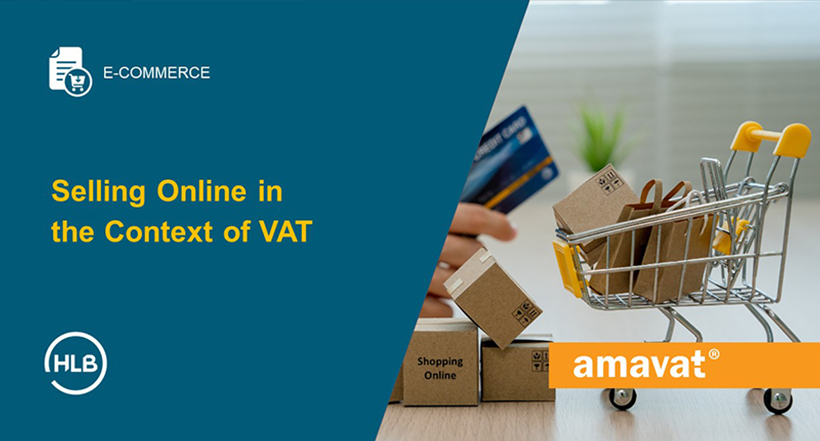Selling Online in the context of VAT
Online sales and VAT – a crucial aspect in e-commerce accounting. The diversity of regulations, numerous procedures, and exceptions make VAT reconciliation challenging for the e-commerce sector. How does VAT exemption work in e-commerce accounting? How to reconcile VAT in Poland and EU VAT, and is it worthwhile to utilize the VAT e-commerce package? When does the VAT tax obligation arise in e-commerce sales, and what is the presumption principle? Here are the fundamental principles of VAT reconciliation in the e-commerce industry.
VAT exemptions in e-commerce accounting
When conducting online sales in the realm of e-commerce accounting, it’s essential to verify whether a given entity qualifies for VAT exemption: either subjective or objective. Subjective exemption applies to e-commerce entities whose sales value did not exceed PLN 200,000 net in a given tax year. However, it does not apply to online stores selling:
- Cosmetic and toiletry products
- Computers, electronic, and optical products
- Electrical and non-electrical household equipment
- Machinery and equipment not elsewhere classified
- Wholesale and retail trade of parts for motor vehicles and motorcycles
On the other hand, objective exemption is applied in cases such as the provision of insurance, medical, or educational services, and as a rule, it does not apply to the e-commerce industry. There is no monetary limit associated with this type of exemption.
E-commerce sales and the emergence of VAT tax obligation in e-commerce accounting
Another crucial aspect is the timing of the VAT tax obligation in the case of the goods and services tax for e-commerce market transactions. In principle, it arises at the moment of delivering goods or providing services. However, in the case of online sales with shipment, receiving payment (in full or in part, e.g., deposit or partial prepayment) before dispatching the goods triggers the tax obligation.
In the case of cash-on-delivery payments, the tax obligation arises either at the time of delivering the goods or receiving payment – whichever event occurs first decides the moment of tax obligation.
VAT considerations for cross-border e-commerce sales within and outside the European Union
In the context of e-commerce operations and online store management, it is mandatory to register for VAT-EU before the first sale from Poland to another European Union (EU) country. This registration process is completed through the VAT-R form. If an e-commerce entity provides electronic services to consumers (individuals not engaged in business activities), the VAT accounting treatment is generally based on the country of residence or domicile (permanent establishment) of the buyer. The obligation to settle VAT in the buyer’s country remains with the service provider. In the case of B2B transactions, the reverse charge mechanism applies, and VAT is accounted for in the country where the business buyer is established.
However, for e-commerce sales beyond the EU, there is no requirement to apply VAT when invoicing (clearly indicating the exemption on the invoice). In this scenario, the responsibility for tax matters lies with the customer in the destination country.
E-commerce sales in the EU and VAT accounting in Poland
Online stores and entities engaged in e-commerce that conduct e-commerce accounting and sell electronic services to consumers in EU countries other than Poland have the option to account for VAT in Poland under the Consumption Country Taxation (WSTO) regime.
This choice is made by submitting a notification to the head of the tax office by the 10th day of the month following the month in which the decision was made (electronically using the VAT-29 form). Until the relevant sales threshold is exceeded (10,000 euros/42,000 PLN), Polish entrepreneurs apply the same VAT treatment as for domestic sales – using the Polish VAT rate.
To qualify, businesses must meet the following conditions:
- The entity has its business establishment, permanent residence, or ordinary place of residence in one EU member state
- Electronic services are provided to consumers with their residence, permanent address, or ordinary place of residence in an EU member state other than the e-commerce entity’s country.
- The total value of electronic services provided to these consumers and intra-Community distance sales of goods does not exceed the unified limit in all EU countries within a tax year (from July 1, 2021, following the introduction of the VAT e-commerce package) – 10,000 euros (42,000 PLN).
Settlement of EU VAT in e-commerce accounting after exceeding the 10,000 euro threshold – VAT OSS procedure
When an e-commerce entity surpasses the annual threshold of 10,000 euros / 42,000 Polish zlotys, until recently, it was required to settle VAT in its country of residence and register in all EU countries where its customers were located.
However, as of July 1, 2021, the VAT e-commerce package was introduced, incorporating the VAT OSS procedure, replacing MOSS. This allows for the settlement of VAT on the sale of services in the online industry across all EU countries in a single quarterly declaration (VIU-DO), filed in Poland. The VAT-OSS procedure specifically concerns EU member states and does not apply, for example, to sales to the United Kingdom or Switzerland. Additionally, it is exclusively designed for businesses selling goods or services to individual customers, not to other businesses.
Registration for VAT OSS does not conflict with VAT-UE registration. It also does not result in the loss of the right to VAT exemption; sales settled under the VAT OSS are not considered when verifying the sales limit for VAT exemption.
VAT in the VAT OSS procedure is remitted in euros in the country where the business is conducted – electronically in the Second Tax Office in Warsaw-Śródmieście in the case of Poland. Opting for the VAT OSS procedure requires the entrepreneur to apply it to all transactions conducted in EU markets.
The VAT e-commerce package has also introduced other procedures to simplify transaction settlement in e-commerce accounting, including IOSS (distance selling of goods imported from other countries, where the shipment value does not exceed 150 euros) and USZ, eliminating VAT exemption for the import of goods in shipments valued up to 22 euros for the entire EU, as well as a new definition of distance selling of imported goods – SOTI, replacing the “distance selling” definition with a new intra-Community distance selling definition – WSTO.
The VAT e-commerce regulations in accounting for e-commerce naturally apply within the European Union. In the case of conducting e-commerce sales outside the EU, VAT must be settled according to local regulations in third countries.
More information about settlements and benefits arising from the VAT e-commerce package can be found here.
VAT e-commerce and dropshipping
In the dropshipping model, based on sales intermediation, the subject of taxation is the intermediary service – VAT rates applicable to intermediary services apply. When the buyer is a VAT taxpayer, taxation should occur in the country of its residence or business operations.
VAT on dropshipping is handled somewhat differently when an e-commerce entity sells goods in its own name. When the e-store sends its goods – belonging to it – from Poland to private customers in EU countries, it can treat such transactions as intra-Community distance sales and, as long as it does not exceed the IOSS limit (€10,000), it can tax such transactions in e-commerce accounting using Polish VAT rates and settle the tax in Poland.
After exceeding the €10,000 limit, the owner of the online store must tax their sales with the rates applicable in the respective EU member state of the buyer and settle VAT there or use the VAT OSS procedure. If dropshipping is done using a sales platform, it is often the platform that is obliged to settle VAT in e-commerce accounting.
In the case of dropshipping in e-commerce accounting, there is also the possibility of VAT exemption. The basic condition is not exceeding the limit of PLN 200,000 in net turnover annually. Additionally, commercial intermediation (commission-based model) is not necessarily subject to VAT. However, in the sales in one’s own name model, the e-commerce entity cannot sell goods that exclude VAT exemption, including, among others, computers, electronic products, electrical devices, as well as cosmetic and toiletry preparations.
More about the dropshipping model in the e-commerce industry can be found here.
VAT settlement in e-commerce accounting for digital products (Play/AppStore)
Some entities operating in the e-commerce market, selling digital products such as applications or software, can streamline the VAT settlement process in e-commerce accounting by utilizing the services of application stores (e.g., Google Play or AppStore). In principle, these stores are responsible for VAT settlements.
Presumption vs. VAT settlement in e-commerce accounting
In e-commerce accounting, determining the VAT settlement location can be challenging due to the difficulty in establishing the recipient’s location. In such cases, the so-called presumption is applied. To identify the country where VAT should be settled, an e-commerce entity uses two selected pieces of evidence:
- The address on the invoice issued to the service recipient.
- The IP address of the device used by the service recipient or any other geolocation method.
- Bank account details, such as the location where the bank account used for payments is maintained.
- MCC code and the international telephone identity number of the mobile subscriber recorded on the SIM card used by the service recipient.
- The location connecting the stationary service recipient.
VAT settlement in e-commerce accounting. Benefit from our assistance!
Don’t leave your business and tax settlements in e-commerce accounting to chance! Utilize our knowledge and experience to ensure accurate tax settlements and VAT remittance, avoid the risk of non-compliance with regulations, and focus solely on maximizing profits from your e-commerce business!
In the case of VAT settlement in our e-commerce accounting, we can analyze, among other things, the obligation to apply foreign VAT rates in your store, choose the best solution, assist in the VAT-OSS registration process, settle VAT, complete and submit monthly, quarterly, or annual declarations, prepare summaries of VAT declarations, and finally, handle VAT refunds. We will also assess whether you qualify for VAT and VAT-EU exemptions and determine the most suitable model for your business.
If you have any questions about VAT accounting in the e-commerce industry, including the e-commerce VAT package and our e-commerce accounting, please feel free to contact our experts: Contact – amavat®.
amavat® Team
We are an independent member of HLB. THE GLOBAL ADVISORY AND ACCOUNTING NETWORK.






